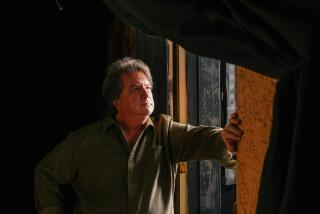Belarus Free Theatre explores oppression through the prism of sex
The sex lives of modern cities — Berlin in the 1920s, New York or San Francisco in the 1970s — tend to be characterized in terms of underground cabarets and over-the-top discos, of fast times fueled by carefree hedonism.
But the sex life of the Belarusian capital of Minsk, as conceived by the Belarus Free Theatre, is about something less flashy and more fundamental.
Human identity and freedom, as seen through the prism of sexuality, are the central concerns of “Minsk, 2011: A Reply to Kathy Acker,” which will play Thursday through Saturday as part of the Off Center Festival of the Segerstrom Center for the Arts. The production by Belarus Free Theatre dramatizes the stories of ordinary people’s erotic lives in the shadow of Europe’s last remaining dictatorship.
PHOTOS: Arts and culture in pictures
Natalia Kaliada, who founded the theater company in 2005 with her husband, Nicolai Khalezin, said by phone that they and their colleague, director Uladzimir Shcherban, had been inspired to develop “Minsk 2011” by Acker’s book “New York City, 1979.” In that candid 1981 volume, Acker, a punk-feminist poet, playwright and novelist who died in 1997, painted a portrait of Gotham society through the lens of the city’s sexual predilections.
But in the capital of the former Soviet republic that sits uneasily between Poland and Russia, sexual expression isn’t simply about full-throttle pursuit of the pleasure principle.
“In societies like ours it’s connected just to a possibility to live,” Kaliada said. “So when we talk about women’s rights, sexual minorities’ rights, it’s just very basic rights. And when the very basic idea of your right is suppressed, obviously you want to resist and you want to prove that it’s your right and it’s your personal zone that nobody has a right to suppress and to take it from you.”
It’s not only individuals and society that get stripped to their essences in “Minsk, 2011.” So does theater.
Performed by nine actors in Russian and Belarusian with English subtitles, the 85-minute production takes place in the simplest of settings, a nearly empty stage, with only a handful of props (plastic chairs, balloons, a rug) augmented by scattered video projections.
The text recounts the often terrifying and degrading daily experiences of Belarusians who are spied on, harassed and imprisoned by a system that regards any behavior (sexual or otherwise) that is not sanctioned by repressive state law as being immoral, subversive and dangerous.
Audiences are given a virtual tour through the city’s erotic precincts: joyless strip clubs; a savagely suppressed gay-pride parade; police interrogations; hookups that deliver despair rather than ecstatic release. The show’s mise-en-scène is, in all senses, raw, even brutal, though not without occasional humor and poetic beauty.
What keeps “Minsk, 2011” from sinking into hopelessness are the glimmers of promise that these undercurrents of protest and resistance may someday bring about transformation. At one level, the show is a mash note to a troubled but dynamic metropolis where the cries and whispers of potential change are in the air.
“This portrait of a city exposes the cruel hypocrisies of Alexander Lukashenko’s regime,” wrote Kate Kellaway of the London newspaper The Guardian/The Observer, referring to Belarus’ autocratic ruler since 1994. “It is a complicated exploration of what it means to love a city that does not return the compliment.”
“Minsk, 2011” addresses the problem of free expression and personal liberty in one particularly repressive country. But Belarus isn’t the only place where individual freedom and identity are being tested today, Kaliada said, even though in Western societies the restrictions may be harder to detect than in authoritarian regimes.
“In open, old democracies, taboo zones are hidden very deeply,” she said. “It’s not possible to see it on the surface. You need to go very deeply to start to understand what’s going on in the society in reality with different groups of people. And it’s really disturbing, because you understand that it’s not presented at public discussions, it’s not presented in the media, it’s not presented by politicians.”
Although several of its productions are contemporary works based in part or in whole on documentary materials, Belarus Free Theatre also has tackled Shakespeare and other classics. “Being Harold Pinter,” which was performed in New York in 2011, is collage-like homage to the British Nobel Prize-winning playwright and activist, in which the political subtexts of Pinter’s existential domestic dramas get dragged to the surface.
The company’s production of “King Lear” premiered at London’s the Globe Shakespeare’s Theatre as part of last summer’s Cultural Olympics tied to the Olympic Games.
Kaliada said that Shakespeare’s spirit even presided over the company’s show “Trash Cuisine,” which dealt with the death penalty and was based on interviews with people in countries that condone capital punishment. The Bard, after all, was a close observer of torture, murder and the oppressive machinery of the state.
“At the very beginning we didn’t want to do any classical plays. We had, and we still have, this firm belief that whatever surrounds us now, it’s more instant than any classical text or plays,” Kaliada said. But “if we talk about Shakespeare, he was the most contemporary writer of his time. So we could say he was the person who started new writing because he was trying to reflect what was happening around him. And the same thing we could talk about Chekhov, who was not accepted at all.”
Although the theater company continues to perform and teach in Belarus, its leadership trio of Kaliada, Khalezin (a playwright whose works are banned in Belarus) and Shcherban have been obliged to take refuge in London. Kaliada said that she and her husband were driven into exile partly because of their support for an aspiring opposition presidential candidate, Andrei Sannikov, a former diplomat and human rights activist.
Since relocating, they have continually lobbied British and U.S. officials, including Hillary Rodham Clinton, to use economic and political sanctions and other measures to bring pressure on Belarus’ government. The company also has received support from the international artistic community. Steven Spielberg, Kevin Spacey and playwright Tom Stoppard are among the marquee names who’ve lent their backing to the company’s mission.
“If not for artists I believe there would be no attention given to Belarus,” Kaliada said. “I would be very happy if politicians would do the same.”
MORE
INTERACTIVE: Christopher Hawthorne’s On the Boulevards
VOTE: What’s the best version of ‘O Holy Night’?
PHOTOS: Arts and culture in pictures
More to Read
The biggest entertainment stories
Get our big stories about Hollywood, film, television, music, arts, culture and more right in your inbox as soon as they publish.
You may occasionally receive promotional content from the Los Angeles Times.







